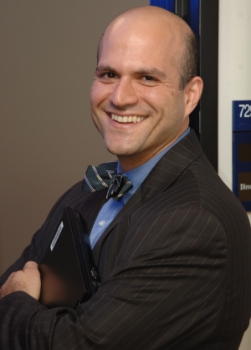 Departing national health IT coordinator Dr. Farzad Mostashari would prefer that the Food and Drug Administration unilaterally issue a long-anticipated final guidance on mobile medical apps rather than waiting for inter-agency consensus with the Federal Communications Commission and Mostashari's own Office of the National Coordinator for Health Information Technology.
Departing national health IT coordinator Dr. Farzad Mostashari would prefer that the Food and Drug Administration unilaterally issue a long-anticipated final guidance on mobile medical apps rather than waiting for inter-agency consensus with the Federal Communications Commission and Mostashari's own Office of the National Coordinator for Health Information Technology.
"I testified before Congress with the FDA, and what we heard repeatedly was folks saying, 'We need clarity,'" Mostashari said in an interview with MobiHealthNews this week at ONC's Consumer Health IT Summit at HHS headquarters in Washington, the first event of the annual National Health IT Week.
"I think the FDASIA work group that we convened with our [Health IT] Policy Committee and with our FDA and FCC colleagues gave us some very thoughtful input, but I personally believe that the sooner FDA moves forward on providing that clarity that people have been asking for, the better," Mostashari said, before being spirited away by his handlers.
The 2012 Food and Drug Administration Safety and Innovation Act (FDASIA) requires the Department of Health and Human Services secretary to work with the FDA, ONC and FCC on "a strategy for coordinating the regulation of health information technology in order to avoid regulatory duplication" and "recommendations on an appropriate regulatory framework for health information technology, including a risk-based framework."
HHS Secretary Kathleen Sebelius, who oversees both the FDA and ONC but not the FCC, is to report to Congress within 18 months of the legislation's passage, or by January 2014. Sebelius formed an FDASIA workgroup under the purview of the Health IT Policy Committee, an HHS advisory panel.
In public remarks during the Consumer Health IT Summit, Mostashari, who is due to depart Oct. 5 after two years as national coordinator and four years with ONC, tried to frame the role of the federal government in health IT adoption and patient engagement. "Government alone cannot make all the changes we need," he said.
What it can do, according to Mostashari, is lead by example, such as it is doing with Blue Button, a program started at the Department of Veterans Affairs to provide a simple interface for patients to download their own health records. He also said ONC is leading a push for industrywide adoption of standards for healthcare data exchange.
Mostashari said another way government can act is by flexing its purchasing power and crafting public policy to encourage behaviors, as it is doing with Meaningful Use. "That policy intent is crystal clear in Stage 2 Meaningful Use," Mostashari said. Stage 2 of the federal EHR incentive program requires at least 5 percent of a provider's patients to take it upon themselves to "view, download or transmit" health information through a portal or personal health record, a provision meant to encourage patient engagement.
According to Mostashari, patient engagement is about patient-centered care, connected health and how people can take better care of themselves and achieve better health, not just safer, more effective care.
Perhaps invoking the late Steve Jobs, Mostashari called those in attendance a "glorious band of misfits." (Dr. Patrick Conway, CTO of HHS and acting head of the CMS Center for Medicare and Medicaid Innovation, said Mostashari called him a "misfit from way back.")
"It is time for this movement to move beyond us misfits and into the broader population," the national coordinator said. "Will providers be supportive?" Mostashari then wondered. "Will patients even care?"
However, Mostashari was optimistic about the progress he has seen on engaging patients during his four years in Washington. "There is nothing to me that stands out more than the shift in this space," he said.













